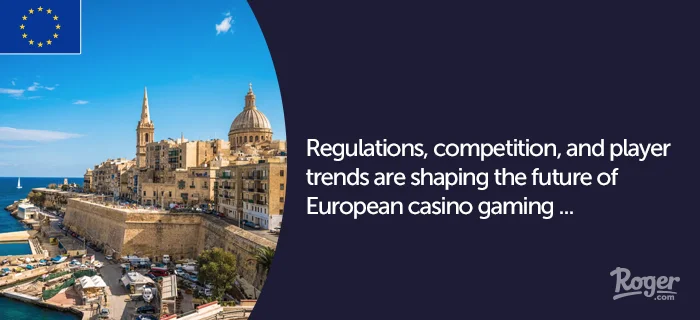It’s no secret that online casinos are popular throughout Europe. Just watch a sports match to see casino and bookie adverts or Google ‘European casinos’, and you’ll find hundreds of flashy options.
🤖 However, these casinos are changing rapidly, especially as new technologies evolve and appear. AI poker, anyone?
Regulations, competition, and player trends are shaping the future of European casino gaming. Let’s delve into each so you know what to expect for future casino sessions.
Table of contents
- How gambling laws in the UK and Europe shape the industry
- Innovations in live casino technology
- The role of blockchain and cryptocurrency
- Competition between top casinos
- The rise of mobile live casino gaming
- The impact on land-based casinos
- Streaming platforms and live casino gaming
- Responsible gaming and player protection
- Conclusion
How gambling laws in the UK and Europe shape the industry
First up, let's look at laws and regulations.
Regulatory frameworks play a crucial role in determining the accessibility and sustainability of live casino platforms.
The UK's well-regulated gambling market tightens rules on responsible gaming and fraud prevention. The UKGC enforces stricter ad policies and affordability checks, reshaping player engagement.
Across Europe, the gambling laws vary—some countries embrace liberalisation, whilst others impose strict limits on operators.
Germany's Interstate Treaty on Gambling enforces strict deposit limits and licensing rules, restricting industry growth. Meanwhile, the Netherlands' licensing system allows international platforms to operate legally under tight regulations.
🤓 Gambling expert Vlad Grindu notes that evolving laws shape European online casinos, impacting games, payments, and marketing. Operators must adapt to stay compliant whilst maintaining engaging live casino experiences.
Innovations in live casino technology
If you’ve played a live casino game recently, you’ll know how advanced this sector is becoming.
🎥 HD streaming and low-latency connections have elevated gameplay, offering multiple camera angles, close-ups, and real-time stats for a more immersive experience.
AI is another factor to watch. This enhances personalisation by analysing player behaviour, allowing operators to tailor experiences for more engaging gameplay.
AI-powered live dealers can also adapt to player behaviour, enhancing interactions based on betting patterns and engagement. AI also helps detect gambling habits, enabling operators to enforce responsible gaming measures. So, prepare for incredible AI changes in the next few years.
But that’s not all. Virtual reality is set to transform live gaming, offering a fully immersive experience where players can walk through virtual casinos and interact with dealers.
Though still early, VR technology is advancing quickly and may soon be a standard feature.
The role of blockchain and cryptocurrency
Blockchain technology isn’t just a Twitter (or X) topic. It’s an innovative payment system that plenty of online casinos are adopting.
Blockchain enhances security and trust between operators and players by providing a decentralised and transparent ledger. These days, many platforms now accept cryptocurrency payments, allowing users to deposit and withdraw funds instantly whilst maintaining anonymity.
👉 Smart contracts are also worth noting. They automate transactions without intermediaries, cutting processing fees and boosting efficiency.
Likewise, blockchain-based RNGs are more common, as they ensure fairness by transparently recording game outcomes that can’t be manipulated.
Despite its advantages, cryptocurrency adoption in gambling is hindered by regulatory uncertainty.
Some European countries have embraced crypto payments, whilst others remain cautious due to concerns about money laundering and financial security. However, as crypto regulations become clearer, its role in live casino gaming is expected to grow.
Competition between top casinos
Across the world, the casino industry is competitive. But the competition is fierce in Europe, as brands battle to attract new players and claim the top spot in the industry.
Leading software providers like Evolution Gaming, Playtech, and Pragmatic Play dominate the market by offering high-quality live dealer games with unique features.
Operators also compete by enhancing user experience through loyalty programs, exclusive bonuses, and gamification elements.
Some platforms have even integrated social gaming features, allowing players to chat with dealers and other participants, replicating the social aspect of land-based casinos. Unsurprisingly, this feature is very popular.
This competitive landscape fuels innovation, ultimately benefiting players with enhanced gaming experiences.
The rise of mobile live casino gaming
Mobile gaming continues to shape the future of live casinos, and players have made it clear that this is their preferred method of play.
With advancements in smartphone technology and 5G connectivity, players can now enjoy high-quality live dealer games from anywhere. Operators are optimising their platforms for mobile use, ensuring seamless gameplay with touch-friendly interfaces.
Casinos are launching dedicated mobile apps with features like push notifications for promotions and personalised game recommendations.
As mobile adoption grows, live casino gaming will become more accessible to a wider audience. Watch this space!
The impact on land-based casinos
The growth of live online casino gaming is influencing traditional land-based casinos—and not always in a positive way.
To battle this competition, many physical casinos are integrating online elements to reach a wider audience, offering hybrid experiences where players can participate in live-streamed games from within the casino itself.
Whilst some argue that online gaming reduces foot traffic to physical casinos, others see it as an opportunity for expansion.
Casinos that embrace digital trends by launching their own live gaming platforms can stay relevant in an increasingly online-driven market.
Streaming platforms and live casino gaming
The rise of streaming platforms like Twitch and YouTube Gaming has contributed to the popularity of live casinos.
These days, you can log onto these platforms and watch someone gamble in real-time.
That’s right! Influencers and professional gamblers stream their gameplay, drawing large audiences who become interested in live dealer experiences. Some casinos even partner with streamers to showcase new games and attract new players.
Why is this so popular? Live-streamed casino sessions create an interactive community where viewers can engage in discussions, ask questions, and learn strategies.
This trend has helped mainstream online live gaming, bridging the gap between casual and serious gamblers.
Responsible gaming and player protection
Let’s address the elephant in the room—gambling and safety.
To succeed in this market, the best European casinos need to put player safety first, even before game selection or bonuses. Otherwise, players might not trust their brands.
👍 European regulators require operators to implement tools like self-exclusion programs, betting limits, and AI-driven monitoring systems to identify at-risk players.
Player verification processes are also being enhanced to prevent fraud and underage gambling. For example, Know Your Customer (KYC) protocols and biometric authentication methods are becoming standard, ensuring a safer gaming environment for all participants.
Conclusion
The future of live online casino gaming in Europe is looking bright, fueled by tech advances, changing regulations, and growing player demand. As more countries fine-tune their gambling laws, operators will have to stay on top of the changes whilst keeping gaming experiences fresh and exciting.
See the best online casinos here.
Or explore the latest industry news and expert casino guide on the Roger blog.





